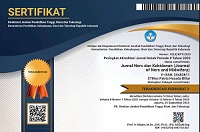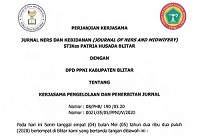The Efect of Breastfeeding Father to Breastmilk Production of Postpartum Mother
DOI:
https://doi.org/10.26699/jnk.v1i3.ART.p205-211Abstract
Many postpartum mothers in Indonesia can not be exclusively breastfed their babies because the breast milk could not be produced smoothly. This is due to postpartum mothers often having experience emotional disturbances which inhibit the release of oxytocin and milk. Breasfeeding father is an active role and involvement of the husband to give moral and emotional support in breastfeeding to release chemical reflexes to produce milk. This research aims to find out the effect of the application of breastfeeding-father to breast milk production. This research was one group time series design. The population of this research was all of normal deliveries of postpartum mothers in puerperal room in Mardi Waluyo Blitar Hospital. The samples selected based on writers for 30 amount people that will be measured their milk production,  breastfeeding  and  the  application  of  breastfeeding  Father,  then  was  given counseling about breastfeeding father and asked to implement it. The data was analized using chi-square test to figure out the difference of breastmilk production between groups applying breastfeeding father and the group did not. The results showed there was differences of breast milk production between groups that applying breastfeeding father and the group did not. So the breastfeeding father could apply the breastfeeding postpartum mothers to increase the breast milk production.
References
Alison, (2013). UNC Researchers Study ‘Love
Hormon’ ties to breastfeeding, postpartum depression. The Journal of Women’s Health. June 13. National Institute of Health.
Bahiyatun. (2009). Buku Ajar Kebidanan Asuhan
Nifas Normal. Jakarta:EGC
Cunningham. F.G.et.al. (2005). Obstetri William
edisi (21). Jakarta:EGC
Februhartanty, J. Strategic roles of fathers in optimizing breastfeeding practice: a study
in an urban setting of Jakarta. (2008). Dissertation. Universitas Indonesia Press
Jakarta
Klier, et.al. (2007). The Role Of Estrogen and Progesteron in Depression After Birth. Journal of Psychiatric, p: 273-279
Mc.Kena, James. (2008). A Breastfeeding- Friendly Approach to Depression In New Mothers. Mei-Juni [diakses 12
Januari 2010]; 1[1]:[11 screen].
Diunduh dari:URL:http://www.NHbreastfeeding TaskForce.org
Nursalam. (2013). Metodologi Penelitian Ilmu Keperawatan Pendeketan Praktis. Ed.3. Jakarta: Salemba Medika. Hlm. 3-413
Nystrom, K. and Ohrling, K. (2004).
Parenthood experiences during the child’s first year: Literature review. J AdvNurs; 46 (3): 319-330.
Pohlman, S. (2005). The primacy of work and fathering preterm infants: Findings from an interpretive phenomenological study. Adv Neonat Care ; 5 (4): 204-
Siregar, Arifin. (2004). Faktor-Faktor Yang Mempengaruhi Pemberian ASI Oleh Ibu Melahirkan. Bagian Gizi Kesehatan Masyarakat.Fakultas Kesehatan Masyarakat. Universitas Sumatera Utara. http://www.library.usu.ac.id.,diakses tanggal 27 Juli 2014
Sullivan, M.L., Leathers, S.J., and Kelley, M.A. (2004). Family characteristics associated with duration of breastfeeding during early infancy among primiparas. J Hum Lact 2004;
(2): 196-205
Downloads
Published
How to Cite
Issue
Section
License
Copyright (c) 2014 Jurnal Ners dan Kebidanan (Journal of Ners and Midwifery)

This work is licensed under a Creative Commons Attribution-ShareAlike 4.0 International License.






